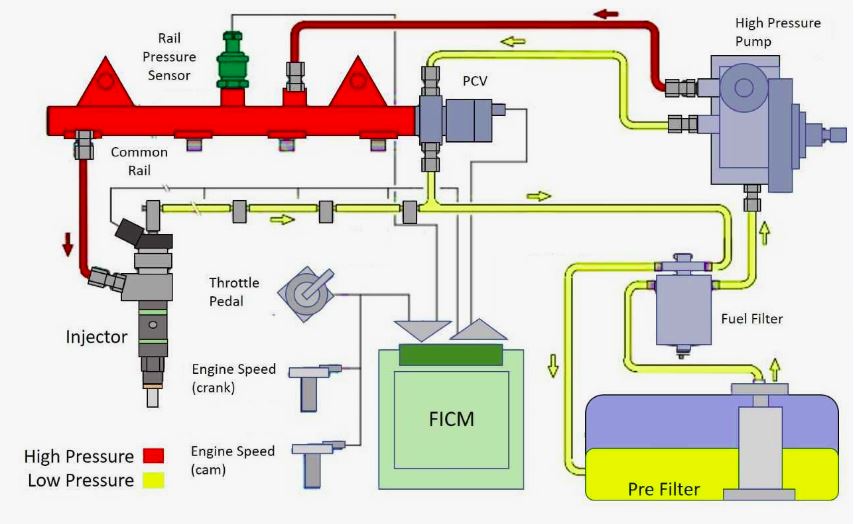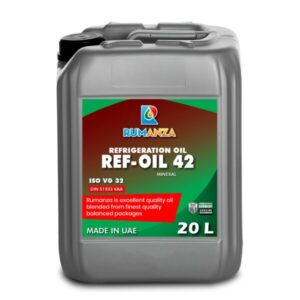What Causes High Oil Pressure in a Diesel Engine : Causes and How to Prevent It
High oil pressure in a diesel engine can be a sign of underlying issues that need to be addressed to maintain the engine’s health and performance. Various factors can contribute to high oil pressure, including problems with the oil itself, the oil filter, or the engine’s internal components. Understanding the causes and symptoms of high oil pressure is crucial for preventing potential damage to your engine.
What Causes High Oil Pressure?
Several factors can cause high oil pressure in a diesel engine oil:
- Thick Oil: Using oil that is too thick (high viscosity) for the engine’s specifications can cause higher resistance to flow, leading to increased oil pressure.
- Cold Engine: Oil is thicker when cold, so starting a diesel engine in cold weather can temporarily cause high oil pressure.
- Clogged Oil Passages: Blockages in the oil passages can restrict oil flow, causing pressure to build up.
- Malfunctioning Relief Valve: The oil pressure relief valve regulates oil pressure. If it malfunctions, it can cause excessive pressure.
- Contaminated Oil Filter: A clogged or dirty oil filter can restrict oil flow, increasing pressure.
- Worn Engine Components: Worn bearings or other engine components can affect oil flow and pressure.
- Faulty Oil Pressure Sending Unit: A malfunctioning oil pressure sensor can give false readings, indicating high oil pressure when it is not actually the case.
Symptoms and Causes of High Oil Pressure in Cars

Symptoms of High Oil Pressure:
- Oil Pressure Gauge Reading High: The most direct indicator is the oil pressure gauge showing higher than normal readings.
- Oil Leaks: High pressure can cause oil to leak from seals and gaskets.
- Engine Overheating: High oil pressure can lead to insufficient lubrication, causing the engine to overheat.
- Strange Engine Noises: Increased pressure can cause unusual noises from the engine due to strain on the components.
Common Symptoms of High Oil Pressure in Cars
- High Oil Pressure Gauge Reading
- Oil Leaks
- Engine Overheating
- Unusual Engine Noises
- Warning Lights on Dashboard
Common Causes of High Oil Pressure in Cars
- Thick or Incorrect Oil: Using oil with higher viscosity than recommended.
- Cold Weather: Starting the engine in cold weather conditions.
- Clogged Oil Passages: Blockages within the engine’s oil passages.
- Faulty Relief Valve: Malfunctioning pressure relief valve.
- Dirty Oil Filter: Contaminated or clogged oil filter.
- Worn Bearings: Worn out or damaged engine bearings.
- Faulty Oil Pressure Sending Unit: Incorrect readings from a malfunctioning oil pressure sensor.
High Oil Pressure: Causes and How to Prevent It

Causes:
- Thick or Incorrect Oil
- Cold Weather
- Clogged Oil Passages
- Faulty Relief Valve
- Dirty Oil Filter
- Worn Engine Bearings
- Faulty Oil Pressure Sending Unit
Prevention:
- Use the Correct Oil: Always use the oil type and viscosity recommended by the vehicle manufacturer.
- Regular Oil Changes: Change the oil at regular intervals to ensure it remains clean and free from contaminants.
- Maintain Oil Filter: Replace the oil filter during oil changes to prevent blockages.
- Inspect Oil Passages: Ensure oil passages are clean and free from debris.
- Check Relief Valve: Regularly inspect and replace the oil pressure relief valve if necessary.
Bad Sending Unit
A faulty oil pressure sending unit can give false readings on the oil pressure gauge, indicating high oil pressure when it is not actually the case. This can lead to unnecessary concerns and potential misdiagnosis of the engine’s condition.
Clogged Oil Passages
Malfunctioning Relief Valve
Contaminated Oil Filter
Wrong Oil
What Happens to Your Vehicle When the Oil Pressure is Too High?

When oil pressure is too high, it can cause several problems:
- Oil Leaks: Excessive pressure can cause oil to leak from seals and gaskets.
- Engine Damage: High pressure can lead to insufficient lubrication, causing wear and tear on engine components.
- Overheating: Lack of proper lubrication can cause the engine to overheat.
- Increased Strain: High oil pressure puts additional strain on the engine, potentially leading to premature failure of components.
How to Prevent High Oil Pressure
- Change the Oil Regularly: Regular oil changes keep the oil clean and free from contaminants, preventing blockages and ensuring proper lubrication.
- Perform Maintenance Every Year: Regular maintenance checks can identify potential issues before they become serious problems.
- Use the Correct Oil: Always use the recommended oil type and viscosity for your engine.
- Replace the Oil Filter: Replace the oil filter during every oil change to prevent blockages.
- Inspect Oil Passages and Relief Valve: Ensure oil passages are clear and the relief valve is functioning correctly.
Change the Oil Regularly
Perform Maintenance Every Year
Where to Get Replacements for Parts Damaged by High Oil Pressure
If high oil pressure has caused damage to your engine components, it is crucial to get high-quality replacement parts. You can obtain these from:
- Authorized Dealerships: Genuine parts from authorized dealerships ensure compatibility and reliability.
- Reputable Auto Parts Stores: Trusted auto parts stores provide high-quality aftermarket parts.
- Online Retailers: Websites like Amazon, AutoZone, and RockAuto offer a wide selection of parts for various vehicles.
Final Thoughts
FAQs

Essential Guide: Choosing the Right 2-Stroke Universal Oil
Essential Guide: Choosing the Right 2-Stroke Universal Oil for Your Vehicle Discover More When it comes to maintaining the longevity and performance of your two-stroke engine, choosing the right universal oil is crucial. Whether you own a motorcycle, chainsaw, lawnmower, or any other two-stroke engine vehicle, using the correct oil can make a significant difference. This comprehensive guide will walk you through everything you need to know about selecting the right 2-stroke universal oil for your vehicle. What is 2-Stroke

Railroad Engine Oil: Types, Benefits, and Maintenance Tips
Railroad Engine Oil: Types, Benefits, and Maintenance Tips Discover More Introduction to Railroad Engine Oil Railroad engines are powerful machines designed to handle large amounts of load over long distances. To maintain their performance, it is essential to use the right engine oil. Railroad engine oil not only lubricates but also prevents corrosion and reduces wear and tear on the engine parts. This article provides a detailed look at the types of railroad engine oil, their benefits, and key maintenance

Antiwear Additives: Types, Mechanisms, Role and Applications
Antiwear Additives: Types, Mechanisms, Role and App Discover More In industrial machinery and automotive applications, wear and friction are unavoidable but damaging effects on metal parts. Over time, they lead to reduced efficiency, increased maintenance costs, and eventually the failure of critical components. Antiwear additives are chemical compounds that play a crucial role in mitigating these effects. By forming protective layers on metal surfaces, they reduce the rate of wear and extend the lifespan of machinery. In this article, we’ll

Furnace Fuel Oil: A Comprehensive Guide to Efficient Heating
Furnace Fuel Oil: A Comprehensive Guide to Efficient Heating Discover More Introduction to Furnace Fuel Oil and Its Role in Heating As the cold months approach, many households are concerned about ensuring a reliable, efficient heating source. Furnace fuel oil, commonly known as heating oil, provides a dependable solution for keeping homes warm and cozy. Known for its ability to produce intense heat quickly, fuel oil remains a popular choice in regions with particularly cold winters, where reliable heat is

Rumanza Oil and Gas: Pioneering Energy Solutions in the UAE
Rumanza oil and gas industry: Pioneering Energy Solutions in the UAE Discover More Meeting Energy Demand with Innovation and Sustainability In the heart of the global oil and gas sector lies the United Arab Emirates (UAE), a country renowned for its extensive energy resources, commitment to innovation, and vision for a sustainable future. Within this landscape, Rumanza Oil and Gas has emerged as a company dedicated to transforming the traditional energy sector with modern technology and sustainable practices. Driven by

How to Choose the Best Engine Oil for Your Car
How to Choose the Best Engine Oil for Your Car Discover More Choosing the right engine oil for your vehicle is critical for optimal performance, engine longevity, and fuel efficiency. The process might seem overwhelming with various brands, types, and grades on the market, especially as the automotive engine oil market grows with specialized options. Understanding key factors like engine type, oil grade, and manufacturer recommendations will help you make an informed decision. Here’s a guide to selecting the best

Refrigeration Oils Explained: Choosing the Best for Your System
Refrigeration Oils Explained: Choosing the Best for Your System Discover More Refrigeration oils play a crucial role in maintaining the performance and longevity of refrigeration and air conditioning systems. Understanding their properties and selecting the right type for your specific system is essential for smooth operation. This guide delves into the types, properties, and selection criteria for refrigeration oils, giving you insights into choosing the ideal oil to protect and enhance your refrigeration system’s efficiency. Understanding Refrigeration Oils Refrigeration oils,

Accel-Pace1 Diesel Engine Oil: Ultimate Choice for Engine Longevity
Accel-Pace1 Diesel Engine Oil: The Ultimate Choice for Engine Longevity Discover More Introduction: The Importance of Engine Longevity Modern diesel engines are powerful machines, and the key to maintaining their performance over time is choosing the right oil. Accel-Pace1 Diesel Engine Oil stands out as a leader in engine longevity, offering premium protection against wear and tear. In this comprehensive guide, we’ll explore how Accel-Pace1 extends engine life, enhances performance, and provides cost-saving benefits. What Makes Accel-Pace1 Diesel Engine Oil

Accel-DXT Pro Diesel Engine: Choice of Champions in Automotive
Accel-DXT Pro Diesel Engine: The Choice of Champions in Automotive Performance Discover More When it comes to diesel engines, performance, reliability, and endurance are non-negotiable features that separate champions from the rest. The Accel-DXT Pro Diesel Engine sets a new benchmark in automotive performance, making it the ultimate choice for professionals and enthusiasts alike. Whether you’re competing in high-stakes motorsports or simply demand the best for your vehicle, the Accel-DXT Pro delivers exceptional power, fuel efficiency, and durability. The Evolution

Why Accel-DX Diesel Engine Oil is Perfect for Heavy-Duty Engines
Why Accel-DX Diesel Engine Oil is Perfect for Heavy-Duty Engines Discover More Diesel engines are the backbone of many industries, from transportation and logistics to construction and agriculture. These engines are known for their durability, torque, and ability to operate under extreme conditions. However, to maintain peak performance, heavy-duty diesel engines require high-quality engine oils that can withstand the pressures and stresses of their operations. One such solution is Accel-DX Diesel Engine Oil—a product designed specifically for the demanding needs






